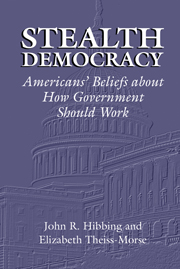Book contents
Introduction
Published online by Cambridge University Press: 23 November 2009
Summary
For the past decade we have been studying Americans' attitudes toward their government. Since dissatisfaction is common and since we believe dissatisfaction with government can be dangerous, we were moved to ask people about the particular type of government that might increase levels of satisfaction. Their answers, properly interpreted, directly contradict standard elite interpretations of popular desires. Specifically, pundits, politicians, and even many social scientists believe that Americans are populists, that they distrust any decision maker who is not an ordinary person or who is not at least intimately connected to ordinary people. Americans prefer to rule themselves, the argument goes, and will support any reform that empowers the people at the expense of elites. Only if direct democracy is not feasible will they accept a representative system and even then only if representatives act simply as mouthpieces for the people's wishes – wishes that individuals are eager to offer to elected officials if only those officials would listen.
THE BOOK'S THESIS
But this conventional description has been put together with remarkably little direct input from ordinary Americans. When we started listening to the people and taking seriously what they had to say, we were led to conclude that this conventional wisdom was not just somewhat misguided, it was backward. The last thing people want is to be more involved in political decision making: They do not want to make political decisions themselves; they do not want to provide much input to those who are assigned to make these decisions; and they would rather not know all the details of the decision-making process.
Information
- Type
- Chapter
- Information
- Stealth DemocracyAmericans' Beliefs About How Government Should Work, pp. 1 - 12Publisher: Cambridge University PressPrint publication year: 2002
